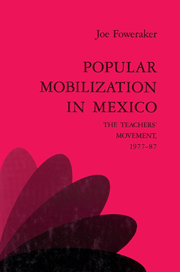Book contents
- Frontmatter
- Contents
- Preface
- Glossary of acronyms
- Introduction: The character and context of popular mobilization in contemporary Mexico
- PART I POPULAR MOVEMENT AND SYNDICAL STRUGGLE
- PART II INSIDE THE MOVEMENT IN CHIAPAS
- PART III NATIONAL MOBILIZATION AND SYSTEM RESPONSES
- PART IV POPULAR MOVEMENTS AND POLITICAL CHANGE
- 10 Institutional linkage
- 11 The political system
- 12 The political meaning of popular movements
- Bibliography
- Index
11 - The political system
Published online by Cambridge University Press: 29 September 2009
- Frontmatter
- Contents
- Preface
- Glossary of acronyms
- Introduction: The character and context of popular mobilization in contemporary Mexico
- PART I POPULAR MOVEMENT AND SYNDICAL STRUGGLE
- PART II INSIDE THE MOVEMENT IN CHIAPAS
- PART III NATIONAL MOBILIZATION AND SYSTEM RESPONSES
- PART IV POPULAR MOVEMENTS AND POLITICAL CHANGE
- 10 Institutional linkage
- 11 The political system
- 12 The political meaning of popular movements
- Bibliography
- Index
Summary
There are no guarantees that political changes achieved in civil society will necessarily be extended into the institutional organization of the political system (see Chapter 10), and popular claims to legal and political rights may not be recognized by government, which, on the contrary, may respond with more repression. In the Mexico of the past twenty years, in particular, the pressure of popular movements has prompted the political system to undertake a halting and contradictory process of “liberalization,” with results that have not in fact been very liberal, let alone democratic. In historical perspective this should cause no surprise. Mexico has no tradition of liberal democracy (Meyer 1983), and no regime initiative is likely to begin one (Whitehead 1988; Cornelius 1986a); in effect, the “democratic openings” and “political reforms” of these years have wrought no real change in the political practices of the ruling party (Gentleman 1987b), which by the middle of 1986 seemed to have recognized that the “liberalization” had reached a dead end (Cornelius 1986a). In this sense the process of “liberalization” can be seen as a true measure of the constraints on the reform of the system (Alvarado 1987), or as an attempt further to institutionalize the regime of the Institutional Revolutionary Party (the PRI) in circumstances of fiscal and economic crisis, and increasing popular pressure.
This thumbnail account conforms to the general recognition of the resilience of the political system, which is demonstrated in its flexible and effective response to independent unionism, in its containment of democratic tendencies inside union corporations, and in the cynical manipulation of the electoral process (Gentleman 1987b).
- Type
- Chapter
- Information
- Popular Mobilization in MexicoThe Teachers' Movement 1977–87, pp. 157 - 170Publisher: Cambridge University PressPrint publication year: 1993

